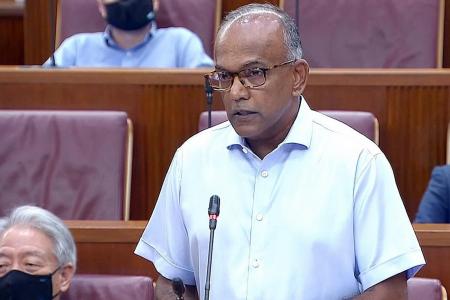Racism will become normalised if Singapore isn’t careful: Shanmugam
K. Shanmugam called on all members of the House to condemn such behaviour
Groups have been capitalising on Singaporeans' anxiety over jobs to fan the flames of xenophobia and racism, and such racist behaviour will become normalised if Singapore is not careful, said Law and Home Affairs Minister K. Shanmugam yesterday.
Calling on "responsible" opposition parties to take a stand on the matter, he urged all members of the House to condemn racist behaviour in Singapore.
"The majority of Singaporeans are decent and not racist, but if we continue to fan the flames of racism, we will get to a more uncomfortable position," he said.
"(Singapore) will fail if we allow racism and xenophobia to become prevalent, and it is contrary to everything that has made us successful and proud to be Singaporean."
Responding to Mr Murali Pillai (Bukit Batok) on the steps the Government will take to nip in the bud racism arising from the pandemic, Mr Shanmugam said that an alleged attack on a woman last Friday appears to be racist conduct, based on her account of the incident.
Madam Hindocha Nita Vishnubhai, 55, had been brisk walking towards Choa Chu Kang Stadium at about 8.30am last Friday when she had a run-in with a 30-year-old Chinese man.
He shouted a racial slur at her for lowering her mask below her nose and kicked her in the chest, even though she told him that she was exercising.
Police arrested the man yesterday and are investigating the case.
Mr Shanmugam said that while racism has always existed in Singapore, as it has in other countries, such sentiments have been stoked lately, here and across the globe.
In the midst of the pandemic, Asians, particularly the Chinese, are being attacked in the United States, with the coronavirus described as the "Chinese virus" or the "Wuhan virus" - as if viruses have a nationality, he said.
"We condemn that. Equally, we have to condemn such behaviour in Singapore."
Singaporeans have legitimate concerns about foreigners taking over their jobs, fuelled by unfair employment practices that favour hiring foreigners and discriminate against local workers, among other things, Mr Shanmugam said.
"It is a minority who behave like this, but it naturally makes Singaporeans unhappy," he said, adding that the Government has taken steps to deal with such bad practices.
But he said parties in Singapore have also deliberately stoked these fears, much like what is seen in the US, by encouraging racism and xenophobia as well as engaging in "dog whistling" - the use of coded or suggestive language that seems innocent to a general audience to communicate something more insidious to a particular group.
"That is dangerous for Singapore. Because first, it'll be expat Indians. Then, it will come to Singaporean Indians...
"If we go down this route, eventually all Indians can be a target of hate," he said.
He noted that not everyone can distinguish between foreign-born Indians and Singaporean Indians, and that the woman who was allegedly attacked has been a citizen for 25 years.
His remarks came a day after multiple Cabinet ministers spoke out against the incident, including Prime Minister Lee Hsien Loong.
Flagging websites that deliberately fan the flames of racism, Mr Shanmugam said: "They are anti-Government, and that is perfectly okay. But don't play with race. Comments on these sites have Indians being called 'cockroaches', 'rapists' and so on. We should be ashamed that, in the name of free speech, we allow such comments."
Leader of the Opposition and Workers' Party (WP) chief Pritam Singh later said the WP agrees with Mr Shanmugam's statement: "There is no place for racism in Singapore - no ifs, no buts."
This article first appeared in The Straits Times.
FOR MORE PARLIAMENT REPORTS, SEE: Panel reviewing whether cyclists should ride only in single file AND THE STRAITS TIMES
Get The New Paper on your phone with the free TNP app. Download from the Apple App Store or Google Play Store now



